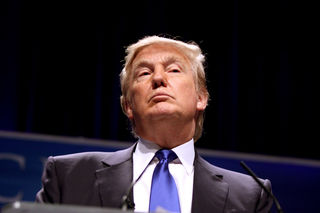President Donald Trump
Why I Think Donald Trump Is Unfit to Be President
Instances where Trump's perspective, insight, and judgment appear impaired.
Posted March 10, 2017

New York City residents in the 1970s, 80s, and 90s couldn’t help but recognize Donald J. Trump as a member of Manhattan’s elite. Before most people outside of New York and New Jersey knew he existed, he was part of the consciousness of New Yorkers. News coverage was more selective back then, but as a glamorous, glitzy, and intriguing skyscraper mogul, his movements, actions, and opinions were meticulously tracked and documented. Being consistently in the spotlight in New York City is no easy task, but Donald Trump knew how to stay relevant. With each new business or personal undertaking, he permeated our local news.
“The Donald” was a frequent guest on Howard Stern’s morning radio show on K-Rock 92.3, WXRK, for many years. Those who listened diligently to his show at the time were privy to many interviews between Howard and Mr. Trump. It was a welcoming platform for him, as Howard's on-air admiration allowed Trump to detail his sexual conquests, power, wealth, prestige, and societal celebrity. Because Trump was unrestrained, the show allowed him a comfortable space to brandish his views on marital fidelity, minorities, and the desirability of women. In a 2005 interview on the show, Trump said, “A person who is very flat-chested is very hard to be a 10.” On the show, and in most other interview situations prior to entering the political arena, Mr. Trump’s accomplishments were celebrated and admired, particularly when he was in charge of the direction of the conversation.
Shortly after Mr. Trump’s divorce from his first wife Ivana became front-page news, they both attended a charity function for a prominent designer fashion label. His presence caused a stir, and based on my personal experience, his behaviors in this social setting were indicative of a person who deemed himself superior to others. I was volunteering that evening, and approached him in order to introduce myself. He said, “Why would I want to talk to you? I wouldn’t even let you suck my d*ck. Look at all the beautiful women here. Don’t waste my time.”
Mr. Trump’s desire to expand his fame and reach is apparent in his subsequent business decisions, including his choice to buy the Miss Universe Pageant in 1996. In an April 2005 episode on Stern’s show, after a question from co-host Robin Quivers about whether or not Trump felt that sleeping with contestants could be a conflict of interest, Trump responded, “Well, what you could also say is that, as the owner of the pageant, it’s your obligation to do that.” He continued on to discuss how he gained access backstage while the female contestants were naked and changing outfits.
He furthered his business empire by supplementing his many cameos in movies and television when, in 2004, he created and starred as host of The Apprentice for 14 seasons. Mr. Trump, often flanked by business associates from his own corporation—as well as his family members, including daughter Ivanka and son Donald Jr.—delivered scathing critiques of his contestants, possessing all the power to fire (or hire) his cast of hopeful entrepreneurs. Trump reprised the role for over 160 episodes.
He explained the show's influence in an interview on Larry King Live in 2005, “[The press] used to think that I was this horrible, flame-throwing, terrible tyrant. Right? Now I go on a television show, where basically what I do is fire people, and everyone thinks I’m such a nice guy. Which tells you what a bad image I had.” His phrasing in this instance presented his “bad image” as a thing of the past, repaired by a carefully cultivated public persona.
When people have the power and funds to make their every vision real, it often causes them to believe they are invincible—or at least immune to criticism. Mr. Trump has previously appeared to be relatively measured, and at times easy-going, when he has been able to control the focus, content and direction of public appearances and interviews. But he is also prone to tension, particularly when situations deviate from his expectations.
As President of the United States, he no longer has the luxury of choosing to ignore relationships—specifically those with other world leaders—and in his time in office, this tendency towards tension has regularly been on display in the context of international diplomacy. As an example, a January 2017 meeting with Mexico's President Enrique Peña Nieto was canceled before it began—due to a breakdown in communication and some critical tweets from Trump—intensifying an already-strained relationship between the two countries. "President Trump's insistence that Mexico will pay for [his proposed border] wall has once again just been proven as delusional fiction by the Mexican President," said House Democratic leader Nancy Pelosi at the time.
President Trump's ability to exercise self-control frequently wavers when anyone, especially the press, challenges him. In these instances, he often makes claims that all news sources—with the exception of those that support him—are not only biased, but are the enemy of the people. "As you know, I have a running war with the media. They are among the most dishonest human beings on Earth,” Trump said while speaking at the CIA headquarters on his second day in office. His unfounded allegations are not just limited to the body of the press, but against other Americans as well—including his unsubstantiated claims that former President Obama wiretapped Trump Tower.
He frequently seems disinterested in the ramifications of his actions and communications, as stated in a 60 Minutes interview when Trump said, “When I think I’m right, nothing bothers me.” He also has a tendency towards grandiosity; when discussing his knowledge of Russian hacking, Trump remarked: "I don’t have to be told, you know, I’m, like, a smart person. I don’t have to be told the same thing and the same words every single day for the next eight years,” continuing on that he knew “things that other people don’t know.”
He makes statements like, “I comprehend very well, okay? Better than, I think, almost anybody,” often while he proclaims himself to be uniquely capable of solving the problems of the world. During an interview with Bill O’Reilly in June 2015, he stated, “There’s nobody bigger or better at the military than I am.” Later in that interview, he continued, “I have a way that would be very effective with respect to ISIS.” He regularly makes similar statements claiming that he would be the best, brightest, and most perceptive leader in all presidential situations.
Many who have challenged President Trump have been pushed out of his circle. Sally Yates, for instance, was fired during the President’s second week in office for questioning the legality of an executive order wherein Mr. Trump called for a sweeping ban of people entering the United States from Muslim-majority countries where he does not have business dealings.
The person who holds the office of President must have the mental capacity and endurance to withstand the pressure, responsibility, and exposure that comes with this role. Increased access by the public to President Trump—in both scripted and unscripted situations—has led some observers to wonder if there has been a marked deterioration in Mr. Trump’s cognitive functioning.
In my view, Mr. Trump cannot uphold the duties of this office because even in his first 100 days, his insight and judgment have disintegrated to the point at which his public statements, accusations and tweets seem delusional. Not surprisingly, Trump feels otherwise, declaring, “I think my strongest asset maybe by far is my temperament. I have a winning temperament.” His distorted thinking, disorganized conduct, and erratic, impulsive behavior—combined with his fixation on his own importance—directly impacts our safety as citizens of the United States, and has led me to conclude that he should be removed from the line of duty.
A special thank you to Whitney Klomp for her invaluable editorial contributions. If you'd like to see the expanded version of this article, please visit drsuzannel.com.




